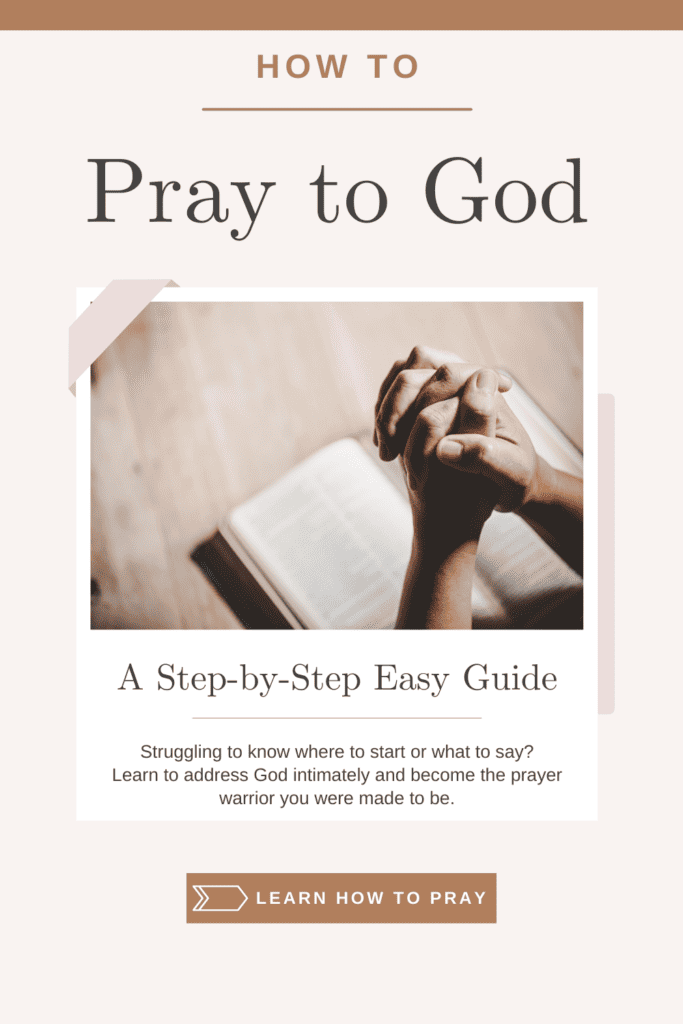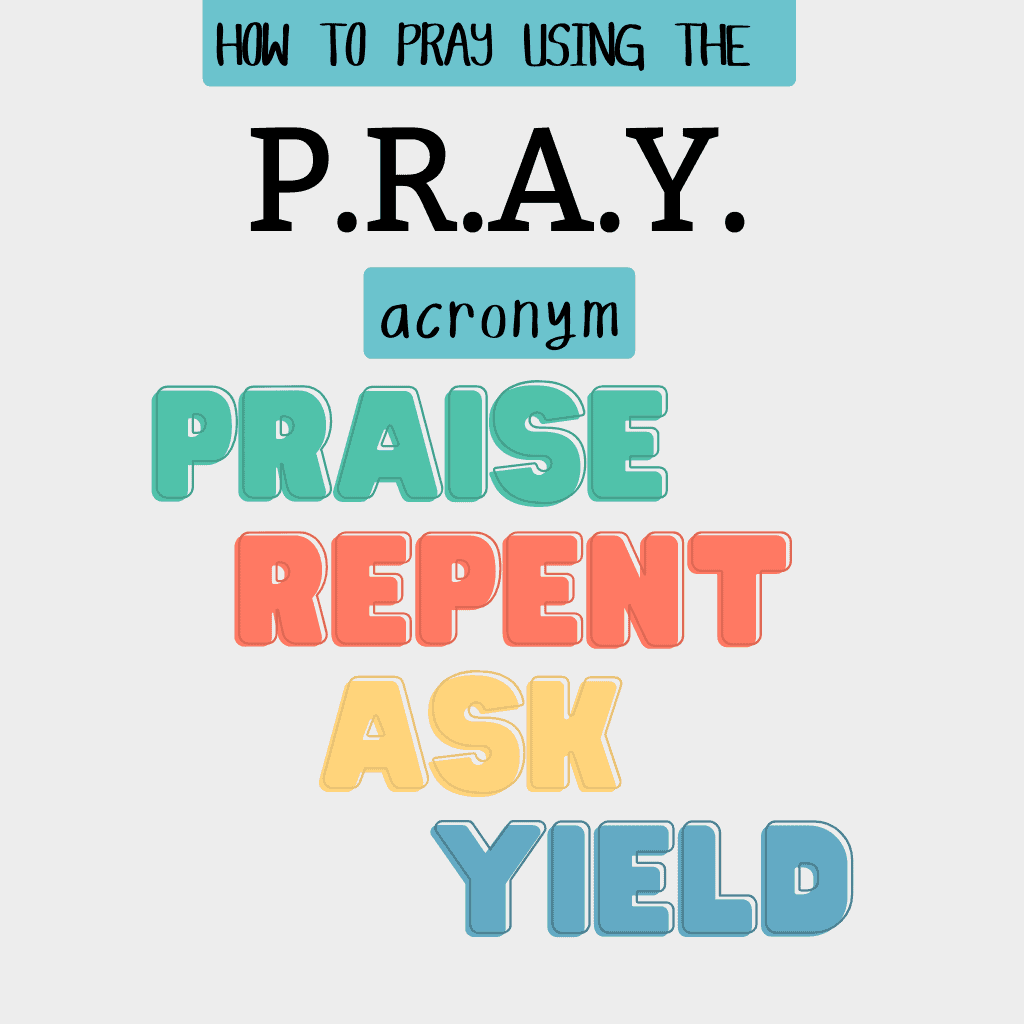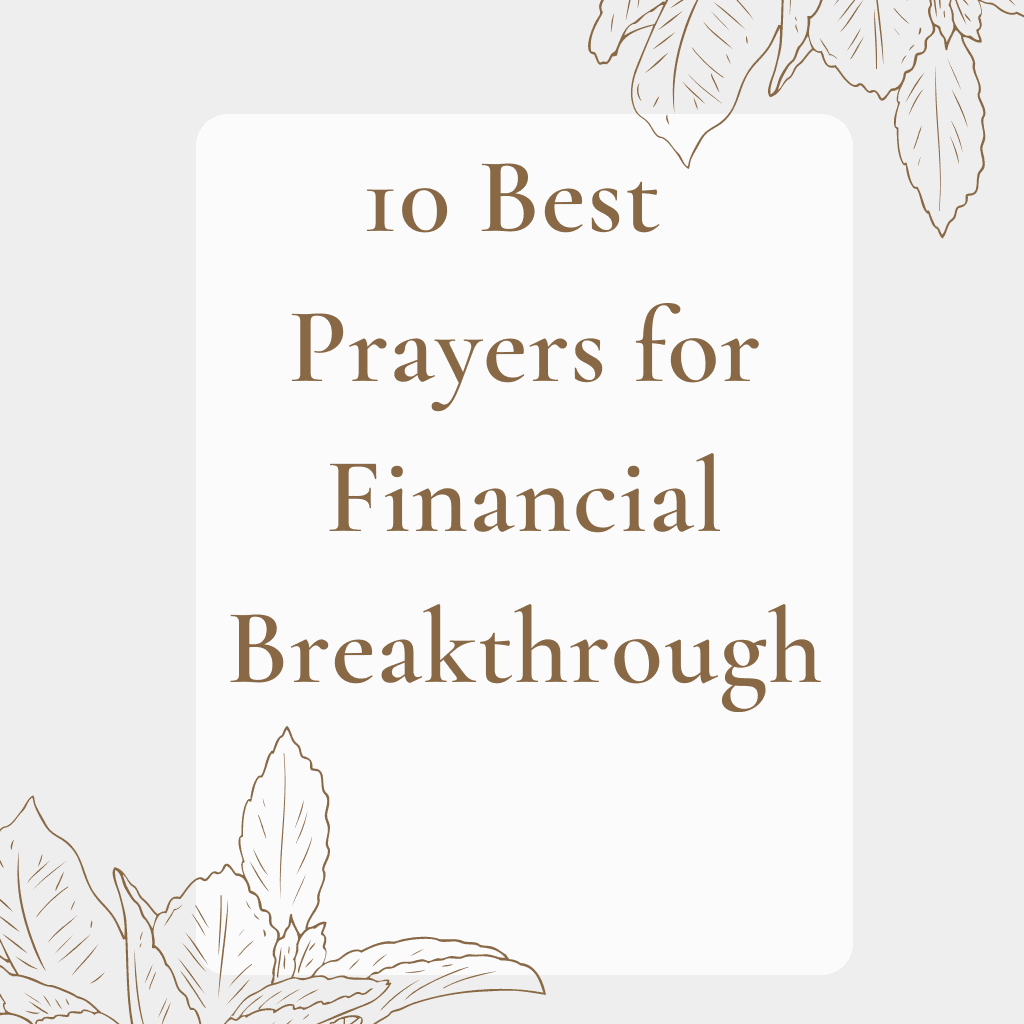Learn How to Pray to God: A Complete Guide
Prayer doesn’t have to be complicated. Learn how to pray and open up communication with your Heavenly Father.
Prayer is essential to the Christian life. Through prayer, we connect with God, seek His will, and open ourselves to His guidance and direction. But for many believers, prayer can feel intimidating or mysterious. In this comprehensive guide, we will demystify prayer and show Christians how to pray and make it a meaningful part of your daily walk with God.
Whether you are just learning to pray or looking to revitalize your prayer life, this guide to prayer will equip you with practical tips and biblical wisdom to grow closer to God through prayer.
- What is Prayer?
- Why Is Prayer Important for Christians?
- Preparing Our Hearts for Prayer
- The Components of Prayer
- The Lord's Prayer as a Model
- How to Start a Prayer
- Learn How to Pray to God: Your Guide to Prayer:
- Step 1: Addressing God
- Step 2: Thanking God
- Step 3: Confessing to God
- Step 4: Supplication: Your Prayer Requests
- Step 5: Have faith in your prayers
- Step 6: Close the prayer in the Name of Jesus Christ and with Amen
- Optional Steps to Prayer:
- 7 Keys to Effective Prayer When You're Learning How to Pray
- What to Say When You Pray
- Praying in Jesus' Name
- The Holy Spirit's Role in Prayer
- Praying Scripture Back to God
- Keep Prayers Simple and Honest
- Prayer as Worship
- Building a Habit of Prayer
- Forgiveness Opens God's Ear
- The Spiritual Benefits of a Vibrant Prayer Life
- Frequently Asked Questions about Prayer
- Join the FREE 7-Day Praying From Scratch Email Series!
What is Prayer?
Prayer is, quite simply, communication with God. It is how believers connect with and build a relationship with their Creator. Prayer allows us to talk to God about anything – our needs, troubles, gratitude, or desires. We can come before Him transparently, presenting our real selves. This honest, intimate communication fosters closeness with Him.
Just like a friendship, unless you communicate it is hard to grow closer to each other. And the less you communicate, the weaker the friendship becomes. We need to pray in order to grow closer to our Savior. Prayer is simply a conversation with God.
Through prayer, we engage with a God who listens, cares, understands, and actively responds. He invites us to bring all aspects of our lives to Him. We can ask Him for help, wisdom, strength, or comfort. We can intercede on behalf of others’ needs. And we can also pray prayers of confession, repentance, praise, and worship. Prayer allows us to align our hearts with God’s will and opens us to receive His peace, joy, and direction for life. It is an incredible gift and privilege.
Why Is Prayer Important for Christians?
Prayer is how we communicate with God. It is our opportunity to speak with the Creator of the universe – an incredible privilege! Prayer allows us to develop a personal and intimate relationship with Him. Through prayer, we are able to:
- Connect with God and recognize His presence in our lives
- Seek forgiveness for our sins
- Ask for God’s help and provision
- Discern God’s will in situations and decisions
- Find comfort, peace, and joy even in difficult circumstances
- Intercede on behalf of others
- Offer praise and thanksgiving to God
The
Preparing Our Hearts for Prayer
Prayer is not simply reciting words; it is communing with the living God. Thus, we need to prepare our hearts to come before His presence. Here are some important ways to prepare for meaningful prayer:
Surrender Your Will
Prayer is not telling God what we want Him to do. Rather, it is surrendering our will to His perfect plan for our lives. We must humble ourselves before Him and submit to His sovereignty.
Confess Any Known Sin
God wants us to approach Him with a clean conscience (Psalm 66:18). Take time to confess any known sin and receive His forgiveness.
Focus Your Thoughts on God
Clear your mind of distractions and set your focus on the Lord. Worship music is one great way to direct your heart and mind to Him.
Ask the Holy Spirit to Guide You
The Spirit intercedes for us in our weakness when we don’t know how to pray (Romans 8:26-27). Ask Him to pray through you.
When we prepare our hearts to seek the Lord, we position ourselves to hear His voice and discern His will. Our motives and focus shift from self to God-centered.

The Components of Prayer
While prayer can take many different forms, most prayers include some essential elements. Using these components can help shape our time with God:
Adoration and Praise
The Psalms are filled with adoration of God’s majesty and character. We exalt His name and worship His supreme worth.
Confession
We humble ourselves by confessing known sins and asking God for cleansing and forgiveness.
Thanksgiving
With gratefulness, we thank God for the blessings in our lives – both big and small.
Supplication
We intercede for ourselves and others, asking God to meet our needs and provide direction and wisdom.
Close with Praise
Just as we opened in adoration, we end prayer time with renewed praise, focus, and surrender to Christ.
Using a model like the ACTS prayer method can provide helpful structure: Adoration, Confession, Thanksgiving, Supplication. But don’t let prayer become rote reciting. Keep your words sincere and heart engaged!
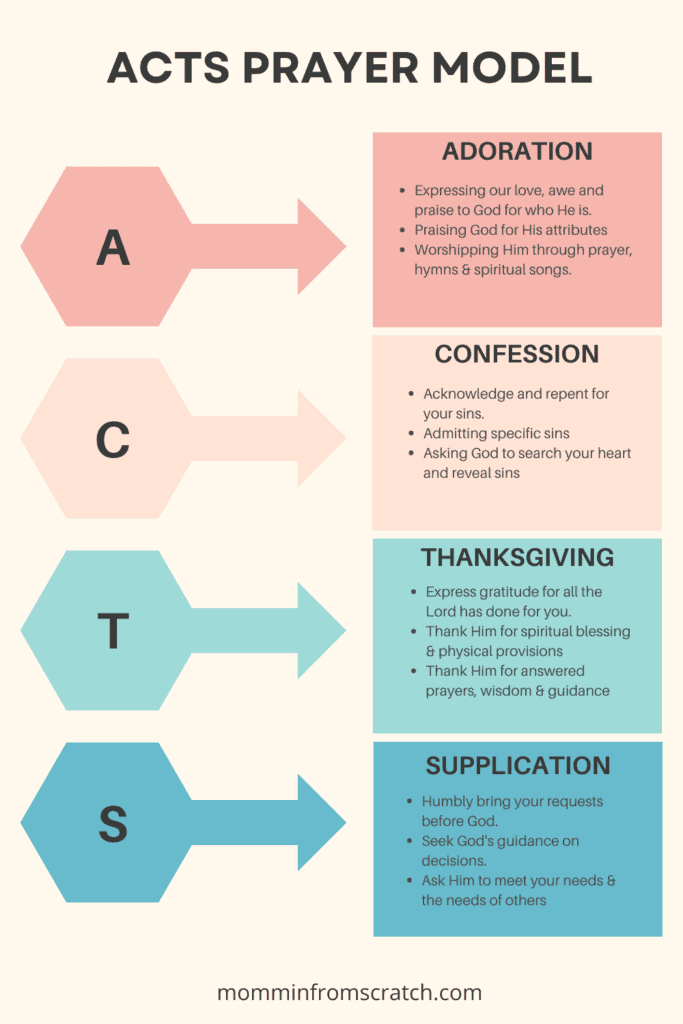
The Lord’s Prayer as a Model
In Matthew 6:9-13, Jesus provided the Lord’s Prayer as a model to teach us how to pray. This beloved prayer succinctly includes each vital element to teach us to pray:
- Our Father in Heaven – We approach God with intimacy as His children.
- Hallowed Be Your Name – Adoration and praise of God’s holiness
- Your Kingdom Come – Surrender to God’s will and His eternal kingdom
- Give Us This Day Our Daily Bread – Humble supplication for provision and needs
- Forgive Us Our Debts – Confession and plea for mercy and forgiveness
- Lead Us Not Into Temptation – Cry for help to resist sin and remain faithful
- Yours is the Kingdom, Power and Glory – Closing praise and renewed surrender
Though we need not recite this verbatim in prayer, using it as a framework equips us with a comprehensive pattern to communicate intimately with our Father.
How to Start a Prayer
Learning how to begin a prayer can sometimes feel awkward, especially if prayer does not come naturally. Use these tips to start smoothly and comfortably:
- Address God – Start by acknowledging you are in His presence and you are praying to God. Call Him Father, Lord, Heavenly Father, God Almighty.
- Praise – Lift your eyes to Him. Sing a song of worship or recite a Psalm.
- Invite the Holy Spirit – Ask the Spirit to guide you in prayer and intercede through you.
- Give Thanks – Cultivate gratitude by thanking God for blessings in your life.
- Confess – Admit any known sins you need to confess and receive forgiveness.
As you begin with this simple pattern, you’ll find yourself quickly immersed in intimate communion with the Lord.
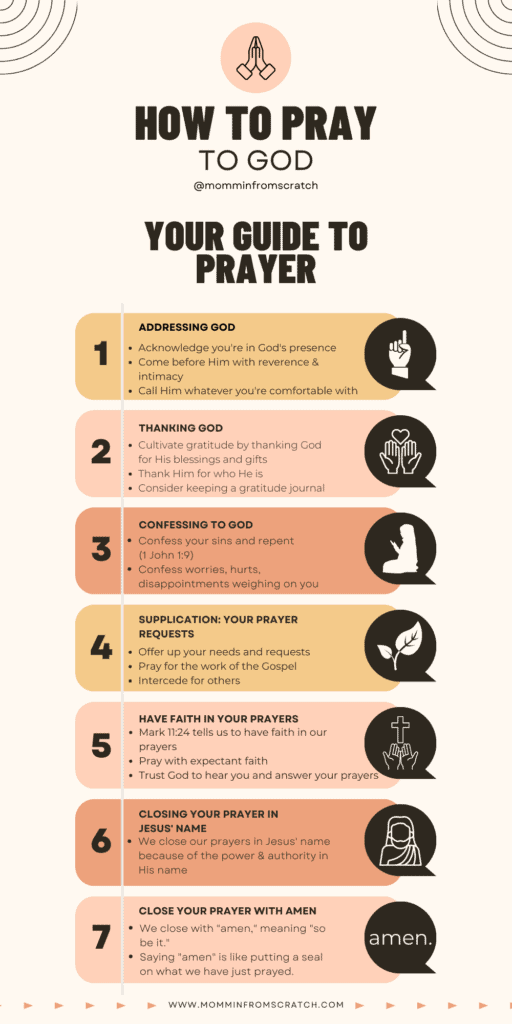
Learn How to Pray to God: Your Guide to Prayer:
I want to be clear that there are no hard and fast rules to prayer. The
Step 1: Addressing God
- Start by acknowledging you are entering God’s presence. Call Him by whatever name you feel most comfortable with. God goes by several names in the
Bible but the most common are names like Father, Lord, God Almighty, My Rock, My Fortress. - Addressing Him directly sets your focus and prepares your heart.
- Come before Him with reverence, awe, and intimacy, depending on your need.
- Jesus addressed God as “Abba Father” showing us we can approach Him with tenderness as a perfect Father.
Step 2: Thanking God
- Cultivate gratitude by thanking God specifically for His blessings and gifts in your life and relationships.
- Thank Him for who He is – His lovingkindness, mercy, patience, power, generosity, etc.
- Let your thankfulness guide you into worshipful adoration. Consider keeping a gratitude journal.
Step 3: Confessing to God
- Humbly bring any known sins to mind that you need to confess and repent of. God promises to forgive and cleanse us. (1 John 1:9)
- Also confess any worries, frustrations, hurts, or disappointments weighing on you and release them to God.
- Confession makes room for the Spirit to fill us afresh with His peace and grace.
Step 4: Supplication: Your Prayer Requests
- Offer up your needs and requests simply and specifically.
- Ask on behalf of loved ones. The
Bible tells us to pray for one another (James 5:16) - Pray for the work of the Gospel, your church, pastors, missionaries, and ministries you support.
- Intercede for the healing of relationships, broken systems, and prodigals to come home.
Step 5: Have faith in your prayers
- “I tell you, whatever you ask for in prayer, believe that you have received it, and it will be yours.” Mark 11:24
- Pray with expectant faith, not doubting God hears and will answer in His time and way.
- Know that when you give a situation to God, you are trusting Him to resolve that situation for you. God answers prayer, He may not answer in the exact way we want Him to, but He hears us, and answers.
Step 6: Close the prayer in the Name of Jesus Christ and with Amen
- We close our prayers “in Jesus’ name” because there is power and authority in His name. As the Son of God, Jesus represents us before God’s throne and opened the way for us to come directly to the Father.
- When we end “in Jesus’ name,” we are relying fully on His righteousness and redemptive work on the cross, not our own merit. We can boldly approach God because of what Christ has done for us.
- Jesus taught that if we ask anything in His name, He will do it so that God is glorified. So we claim the authority and power of Christ’s name over our prayers.
- We close with “amen,” meaning “so be it.” This expresses our confidence that God has heard our prayer and signifies our agreement with Him.
- Saying “amen” is like putting a seal on what we have just prayed. It affirms our belief that God will move in line with His perfect will.
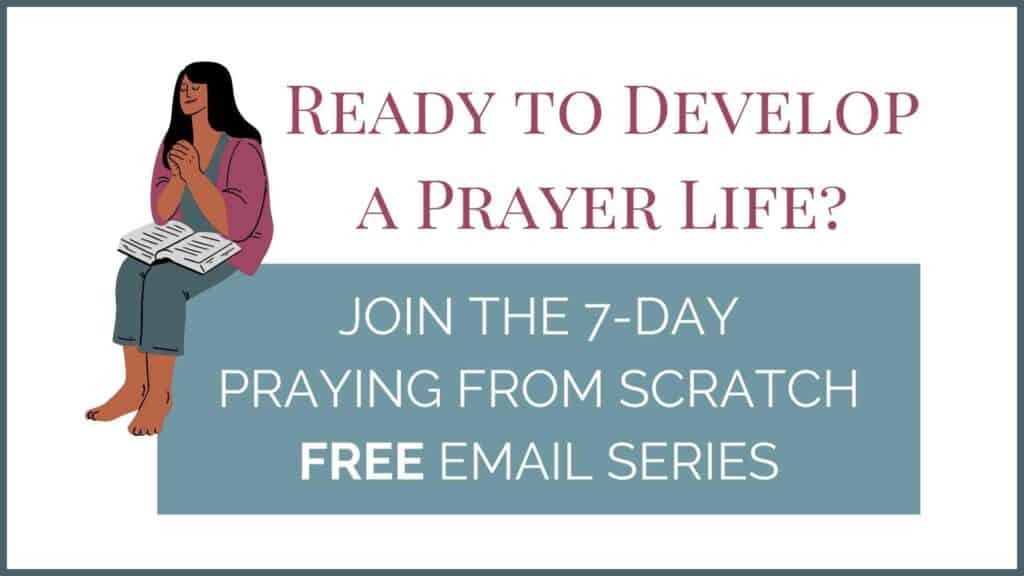
Optional Steps to Prayer:
- Find a quiet, distraction-free location if possible. Many people use a designated prayer space or prayer corner.
- Journaling prayers allows you to process thoughts deeply and record conversations with God.
- Some create a “war room” with Scriptures on the wall to focus their prayers for breakthroughs.
- Kneeling, lifting hands, and laying prostrate before God can heighten reverence and dependence.
- Walking prayers allow you to intercede on behalf of people/places you pass.
- Fasting from food, media, etc. intensifies your spiritual focus as you pray.
- If possible, set aside extended alone time for prayer as Jesus did.
- Play soft worship music in the background to help direct your heart to God.
- Scheduling regular prayer appointments in your calendar can create consistency.
7 Keys to Effective Prayer When You’re Learning How to Pray
Praying effectively requires discipline and intentionality. Apply these 7 proven keys to energize your prayer life and use them as a guide to praying:
Pray Scripture
God’s Word exposes His heart and will. Praying the Psalms back to God is powerful. “The Psalms are 126 psychological experiences-the only book that contains every experience of the human being.” -Unknown You can find verses about prayer here.
Journal Conversations
Writing prayer journals helps process thoughts and hear God’s voice. If you need help finding a
Use Variety
Vary prayer postures – kneeling, lifting hands, laying face down. Speak, sing, weep, sit silently.
Fast
Fasting humbles the flesh and intensifies spiritual focus in prayer.
Make Requests Specific
Narrow down vague requests into distinct petitions requiring specific answers.
Expect Answers
Pray with faith-filled expectations. Watch expectantly for God’s answers.
Wait
Linger in God’s presence once your prayers subside. Soak in His love and peace.
Prayer takes quiet discipline but pays rich dividends. A vibrant prayer life will carry you victoriously through every season of life.
What to Say When You Pray
Many believers feel intimidated or uncertain about what to pray. Remember, God wants us to simply converse with Him – It’s not a formula or ritual. Here are some ideas of what to talk about in prayer:
- Thank Him for specific blessings
- Ask Him to reveal any sins you need to confess
- Present your requests and concerns simply and honestly
- Ask for His wisdom regarding decisions or situations
- Pray for the needs of others
- Intercede for missionaries, pastors, ministries
- Pray God’s Words back to Him
- Sing praise and worship songs to Him
- Tell Him your heart’s desires and pains
- Ask for fresh filling of His Holy Spirit
- Listen silently for a few minutes
- If you need ideas for what to pray for check out my blog post here.

The Holy Spirit will guide you. Just talk to God simply, intimately, and conversationally. There’s no need to sound lofty. He wants you to come just as you are – His dearly loved child.
If you’re not sure what to pray- here are 20 Praying From Scratch Cards!
Praying in Jesus’ Name
Praying in the name of Jesus Christ is vitally important. Jesus instructed His disciples, “You may ask me for anything in my name, and I will do it” (John 14:14). What does it mean for Christians to pray in Jesus’ name?
- His name holds supreme authority. Christ represents us before God’s throne of grace.
- It means we can boldly approach God and receive answers to prayer through Jesus’ redemptive work, not based on our own merit.
- As we close our prayers “in Jesus’ name,” we are submitting to His lordship and relying on His righteousness.
- It signifies our trust in Him as the sole mediator between God and man (1 Timothy 2:5).
Praying in Jesus’ name means coming to God on the basis of Christ’s redemption, not our own goodness. We depend fully on who He is and what He has done for us.
The Holy Spirit’s Role in Prayer
The Holy Spirit is integral to our prayer life. He helps us in multiple key ways:
- Intercedes for Us – He intercedes on our behalf according to God’s perfect will when we do not know how to pray (Romans 8:26-27).
- Brings Revelation – He reveals the heart and mind of God to us as we pray (1 Corinthians 2:10).
- Gives Utterance – He gives us the very words to pray and makes intercession through us (Romans 8:26-27).
- Brings Conviction – He exposes sin in our hearts and motivates us to repentance.
- Comforts – He consoles, encourages, and reassures us of God’s love.
- Empowers – He strengthens and equips us through prayer.
Since prayer is spiritual work requiring God’s grace, we desperately need the Holy Spirit to empower and aid us. Welcome His activity in your prayer times.

Praying Scripture Back to God
Praying Scripture powerfully focuses our prayers, while also deeply rooting our hearts in God’s Word. Here are some tips:
- Meditate on passages about God’s attributes, promises, and will to direct your prayers.
- Paraphrase Psalms to offer back to God in your own words. Talk through them conversationally.
- Claim God’s promises directly related to your needs and situations.
- Ask for the continued revelation of passages’ wisdom and how to apply them.
- Allow verses to expose sin, reveal God’s heart, and renew your mind.
- Insert your name into promises to personalize and claim them.
- Sing or speak Scripture through song – for example, the Lord’s Prayer or Psalms.
As you inject more of God’s Word into your prayers, you’ll find powerful transformation in your heart, mind, and life.

Keep Prayers Simple and Honest
Jesus condemned long, lofty public prayers designed to impress others (Matthew 6:5). We don’t need to spiritualize or over-complicate prayer. God wants us to come to Him sincerely and honestly – just as we would talk with a close friend. Simple, heartfelt prayers are powerful and effective. Consider these tips:
- Use normal, conversational language rather than preachy tones. Talk to God, not at Him.
- Don’t worry about praying “right.” Just talk honestly.
- Pray without pretense or spiritual facade. Admit weaknesses and struggles.
- Keep requests and thanks plain and straightforward.
- Reflect on Scripture simply. Paraphrase verses rather than quoting extensively.
- Allow silence at times to listen to God’s responses.
Prayer requires unguarded honesty before God. Simple prayers pierce His heart and allow intimate communion with Him.
Prayer as Worship
We often associate worship with singing, but prayer is an equally vital expression of worship. Here’s how prayer constitutes worship:
- As we adore God for who He is, we proclaim His supremacy, worth, and glory.
- Confessing sin and surrendering our lives afresh to His lordship honors His holiness.
- Thanking God for His gifts acknowledges His loving generosity and fatherhood.
- Looking to Him for guidance and provision expresses trust in His sovereignty, power, and care.
- Interceding for the lost honors Christ’s passion for souls.
- Praying God’s Word declares His steadfast faithfulness.
- Listening to the Spirit’s voice lifts up Christ’s lordship.
Prayer aligns our hearts with His worth. We exalt God’s rightful place on the throne of our lives. Our communication with Him reflects back His preeminence.
|
3.5
|
3.5
|
3.5
|
3.5
|
|
$9.95
|
$9.38
|
$13.49
|
$9.99
|
Building a Habit of Prayer
Many believers struggle with developing a prayer life. How can we build a strong habit of daily prayer? Consider applying these practical strategies:
- Designate a dedicated space free from distraction to meet with God each day.
- Schedule prayer appointments and pick a time to pray and set reminders to help establish the habit.
- Start small. Aim for just 10-15 minutes early each morning. Increase as the habit sticks so you can pray regularly.
- Use a guided
prayer journal there are some really good journals that will guide you through prayer. Find prayer journals here. - Wake before responsibilities pull you into busyness. Protect quality early time with God.
- Make prayer #1 priority before checking devices, email, or news.
- Pray spontaneously too – on commute, during tasks, before each meeting.
- Vary prayer methods – walking, journaling, kneeling, singing, etc.
- Fast weekly. Coupled with focused prayer, fasting kindles a passion for God.
With priority and discipline, prayer can become as natural as breathing. Determine to persist until consistent time with God takes root.
Forgiveness Opens God’s Ear
Do you ever feel like God doesn’t hear you clearly when you pray? The
Isaiah 59:2 declares, “But your iniquities have separated you from your God; your sins have hidden his face from you, so that he will not hear.”
We are called as believers to freely forgive others, just as Christ has forgiven us (Colossians 3:13). This includes forgiving ourselves as well.
As we release bitterness, resentment, and vengeance to God through prayer, our hearts become cleansed and connected to His heart. Our motives shift from self to other-focused.
We must guard our hearts vigilantly against offense and maintain a posture of humility, compassion, and forgiveness. As we let go of anger toward others, God’s ear inclines closer to our cries.
The Spiritual Benefits of a Vibrant Prayer Life
If your prayer life feels stagnant, remember that persistence pays rich dividends. Here are just some of the blessings that flow from a vibrant prayer life:
- Deeper intimacy and closeness with God
- Increased faith, trust, and confidence in God
- Heightened wisdom, discernment, and sensitivity to God’s voice
- Breakthrough from spiritual strongholds and addictions
- Fresh infilling and empowering of the Holy Spirit
- Renewal and transformation of heart and attitudes
- Power to walk in victory, even during trials
- Growth in love, joy, peace, patience
- Increased effectiveness in ministry and sharing Christ
Time invested in prayer is never wasted. As we devote ourselves to seeking God’s face, He changes us radically from the inside out. Our faith soars as we witness Him answer prayers mightily. Prayer establishes God’s kingdom and purposes here on earth. Make it a priority and watch your relationship with Christ come alive!
Frequently Asked Questions about Prayer
What posture should I use for prayer?
The most important part of prayer is the posture of your heart! There are no required rules. While kneeling or lifting hands can help focus, sit, or stand however you are most comfortable conversing with God. You can walk and talk with God. You can drive and talk with God. Just talk to Him.
Is there a specific place I must pray?
You can pray effectively anywhere at any time! But finding a quiet, private space away from distractions can be helpful, especially when starting out. Jesus often withdrew to solitary places to pray.
Do my prayers have to sound eloquent?
No! God wants you to be real, transparent and honest – not impressive. Keep your language simple, conversational and sincere. Fancy words don’t impress God.
What if I run out of things to say while praying?
That’s completely normal! Don’t fret about silence. Just soak in God’s presence. Listen for His responses. Sing worship songs. Pray Scripture. Allow the Spirit to intercede through wordless groans (Romans 8:26-27).
How do I know God hears me when I pray?
As believers in Jesus, we have the assurance that He hears us! He promises that when we ask according to His will, He hears and grants our requests (1 John 5:14-15). This requires patient faith as we await His perfect timing.
Why do many of my prayers feel unanswered?
God often responds in ways we don’t expect. He sees the full picture. If we walk by faith, we will recognize His answers though they come in unexpected packages. Keep praying in faith!
Who and What should I pray for?
You can and should be praying for everybody! Once you get into a habit of prayer, try adding onto your prayers by praying for those around you, your state, country, government, all believers, and those who don’t know God!
Join the FREE 7-Day Praying From Scratch Email Series!
